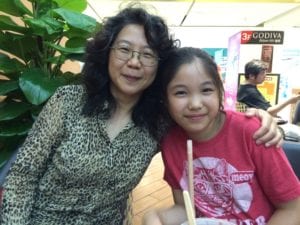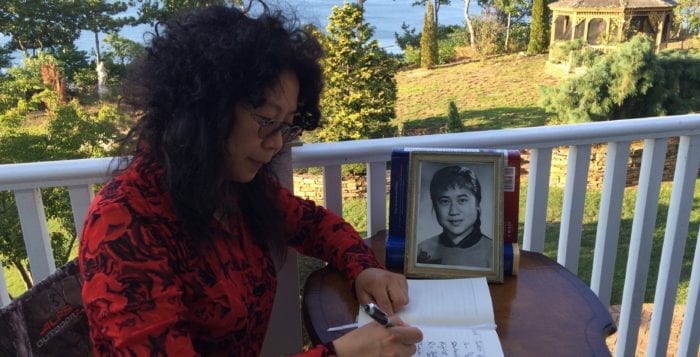SBU’s Zhu uses math to fulfill her mother’s wish
By Daniel Dunaief
Wei Zhu’s long personal and professional journey began in China. Devoted to her mother, Shenzhen Du, Zhu watched her hero fight through a long illness with chronic kidney disease. Shortly before she died, her mother woke from a coma and suggested that her daughter become a doctor, like the people who were helping her in the hospital.
Driven to fulfill her mother’s request, Zhu attended college where, despite aspirations to become a writer like Charles Dickens or Charlotte Bronte, she studied math. She found the subject challenging but stuck with it. “Math was absolutely hard work,” she recalled. “We had to devote longer time to our study than many other majors. It all paid off in my case.”
Indeed, after she completed a one-year graduate program in math, she and her husband, Yeming Ma, came to the United States, where she used her experience in math to explore ways to understand how statistics can provide a perspective on everything from drug dosage to global warming to the causes of cancer.
“You can use math to improve people’s health,” said Zhu, who is now the deputy chair and professor in the Department of Applied Mathematics & Statistics at Stony Brook University.

At the beginning of the year, Yusuf Hannun, the director of the Stony Brook Cancer Center, emailed Zhu to ask her to pitch in to help understand a major question about cancer. In the prestigious journal Science, several researchers had concluded that the “bad luck” hypothesis suggested cancer was something that was written in a person’s genes. This scientific conclusion was akin to suggesting that a character’s fate in a play may have been written in the stars.
Hannun, Song Wu, an assistant professor in her department, Scott Powers, a professor in the Department of Pathology and Zhu came to a different conclusion, which they published in the equally prestigious magazine Nature.
Putting the data and the theory together, the group suggested that lifestyle choices and environmental exposure were also instrumental in this disease. The argument is the equivalent of nature versus nurture for a deadly disease.
“We were able to quantify what we observed,” Zhu said. For most cancers, the group concluded, the majority of the risk was due to lifestyle and environmental factors other than pure intrinsic genetic mutations. The disease debate, scientists recognize, doesn’t end there.
“The entire cancer research community still has a long way to go in order to perfectly understand the causes, prevention and treatments for each cancer, for each individual,” Zhu explained.
Hannun suggested that the direction cancer research is going requires advanced expertise in several areas of applied mathematics, physics and related disciplines. These are now needed for working with large data sets, for modeling pathways and events and for generating new hypotheses and organizing principles, Hannun wrote in a recent email. Hannun described Zhu as “terrific, highly dedicated and very collaborative” and suggested that the work has been “rewarding.”
Zhu is hoping that the recent Nature publication will trigger additional funding to support more research with this team of Stony Brook University scientists.
Wu, who was the first author on the Nature article, described Zhu as “well respected in the scientific community. She has done a lot of work on the analyses of brain image and proteomics data,” he wrote in an email.
Throughout her career, Zhu has sought to use statistics, bioinfomatics and other modern tools to enhance a scientific understanding of complex questions. She recently worked with Ellen Li, a professor of medicine and chief of the Division of Gastroenterology and Hepatology at Stony Brook University School of Medicine, who wanted to understand the development of digestive diseases such as inflammatory bowel disease and colon cancer. Putting the numbers together could provide the kind of information that offers an understanding of how lifestyle and food choices contribute to some diseases over time, Zhu said.
“We have published several papers together over the years,” Zhu said. “We are still in the data collecting stage for the diet analysis.” In her career, which spans 24 years, Zhu has worked on a wide range of topics. She has helped analyze data on the regions of the brain that are active in addiction and helped refine and enhance global climate models. In her early work, she also help pharmaceutical companies come up with optimal drug dosage. Numbers have been a part of Zhu’s life wherever she goes. “You do see numbers in the air,” she said. “When it’s getting hot,” she asks, “what does it have to do with my climate model? Does it fit the data?”
In more recent years, Zhu has struggled with the tension between contributing to larger projects and budgetary constraints. She worries that the “funding situation has changed the dynamics of the job market for the young generation of statisticians,” she said. “Now the majority of my doctoral students hope to focus their research on financial models, instead of biological models.”
Zhu and her husband Ma, who is a financial manager for GE, live in Setauket. Their son Victor, 24, recently earned his graduate degree in finance, while their daughter Merry, 11, attends Mount Elementary School. Zhu appreciates living on Long Island, where she can be close to the ocean.
As she looks back on the developments in her life that brought her to this point in her career, Zhu recognizes that the decision to learn more about math and statistics provided her with the kind of background that allowed her to fulfill her mother’s wish. “I can always honestly tell young students that it is a good idea to choose mathematics or statistics as their undergraduate majors,” she said. It will pave the way for them to have “a solid foundation for a variety of future graduate studies.”







